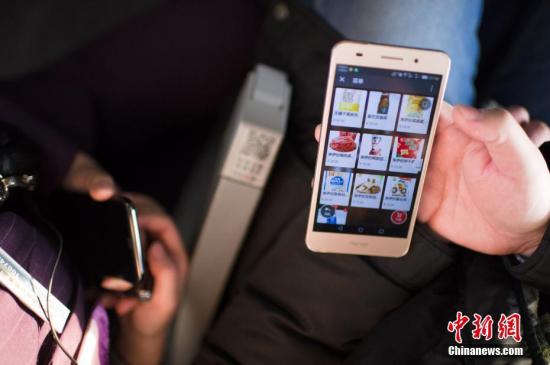China News Service, March 25. According to news from the China Consumers Association website on the 25th, recently, the China Consumers Association received consumers’ reports that when dining at restaurants, some restaurants do not provide manual ordering or even on-site menus for consumption. The user can only follow the official account or mini program to "scan code to order".
In this regard, the China Consumers Association pointed out that "scanning code to order food" should not be a "single choice question", and be wary of "consumption convenience" becoming "consumption trouble."
Data map: Scan the QR code to order.
Photo by Zhang Yazi
The China Consumers Association expressed the following views:
1. Only providing "scan code ordering" is suspected of excessive collection of consumer personal information.
Article 111 of the "Civil Code": "The personal information of natural persons is protected by law. Any organization or individual who needs to obtain the personal information of others shall obtain and ensure information security in accordance with the law,..." "Consumer Rights Protection Law" "Article 29 stipulates: "Operators shall follow the principles of lawfulness, fairness, and necessity in collecting and using consumer personal information, and clearly state the purpose, method and scope of information collection and use, and obtain the consent of consumers...." When consumers go to a restaurant to eat, there is no need to provide mobile phone number, birthday, name, geographic location, address book and other information that has nothing to do with catering consumption.
Some restaurants no longer provide manual ordering, requiring on-site consumers to pay attention to the official account or mini program, and then scan the code to order meals, so as to obtain consumers' personal information, which not only violates the lawful collection and use of personal information according to the law , The principle of proper and necessary, suspected of excessive collection of consumer personal information, and if it is not kept properly, consumer personal information is still at risk of being leaked or lost.
2. Only providing "scan code ordering" infringes consumers' right to fair trade.
According to the first paragraph of Article 10 of the "Consumer Rights Protection Law", “consumers have the right to fair transactions.” The second paragraph of Article 16 stipulates that “business operators shall abide by social ethics when providing goods or services to consumers. , To operate with integrity, to protect the legitimate rights and interests of consumers; not to set unfair or unreasonable trading conditions, and not to force transactions.” Restaurant operators do not provide manual ordering services, but only provide scanning codes to order meals, which not only violates business practices , It also enables the on-site dining consumers to only follow or bind the operator’s official account or mini program, and passively authorize the operator to obtain their personal information.
This practice infringes consumers' right to fair trading, and is a compulsory trading behavior that sets unfair and unreasonable trading conditions and imposes on-site dining consumers.
3. Failure to provide on-site menus undermines consumers’ right to know.
Article 8 Paragraph 1 of the "Consumer Rights Protection Law" stipulates that "consumers have the right to know the true conditions of the goods they purchase, use, or services they receive." Consumers reported that some restaurants only provide scan code ordering. At the same time, it does not provide on-site diners with intuitive and checkable on-site menus and dish prices. Consumers can only see the specific menus and know the prices of dishes after scanning the code and paying attention to the restaurant.
The menu is an important reference basis for consumers to make decisions. It is directly related to whether or not to accept catering services. The restaurant should provide intuitive and checkable on-site menus for consumers to understand the dishes and prices and decide whether to dine.
The practice of not providing on-site menus and reading the dishes and prices only after scanning the code and paying attention has violated consumers’ right to know.
Fourth, the application of new technologies should not become a consumption barrier for special consumer groups.
Due to the complexity of smartphone operations, ordering meals by scanning codes is not universal.
The elderly and minors often need the assistance of others to complete the process of scanning codes and ordering meals, which affects their consumption experience and consumption realization to a certain extent.
Their awareness of potential risks behind "scanning codes" is also relatively weak, and they are more likely to become victims of personal information leakage and even payment security issues.
Operators can use new technologies to improve operational efficiency and provide convenience to consumers, but first, they should comply with laws and regulations and effectively protect consumers' rights and interests.
The application of new technology should not become a tool to restrict consumers' rights, should not be an excuse to grab consumers' personal information, nor should it become a barrier to public consumption.
The China Consumers Association pointed out that the catering industry belongs to the service industry. The innovation of the catering industry should be more empathic thinking from the perspective of consumers, operate with integrity, treat each other fairly, and strive to provide consumers with more and better products on the basis of respecting the wishes of consumers. Service.
Technological progress should allow consumers to enjoy development dividends, rather than becoming a tool for business bullying by operators.
We expect catering industry organizations and catering operators to take active actions to resist bad practices, eliminate illegal behaviors, and take practical actions to protect the legitimate rights and interests of consumers; we also hope that relevant administrative departments will take effective measures to strengthen guidance and supervision, and urge catering companies to operate in compliance Strengthen self-discipline, severely investigate and punish illegal acts that infringe on consumer rights, and promote the healthy, orderly and standardized development of the industry.
The China Consumers Association and local consumer associations will continue to strengthen social supervision over this and protect the legitimate rights and interests of consumers in accordance with the law.

